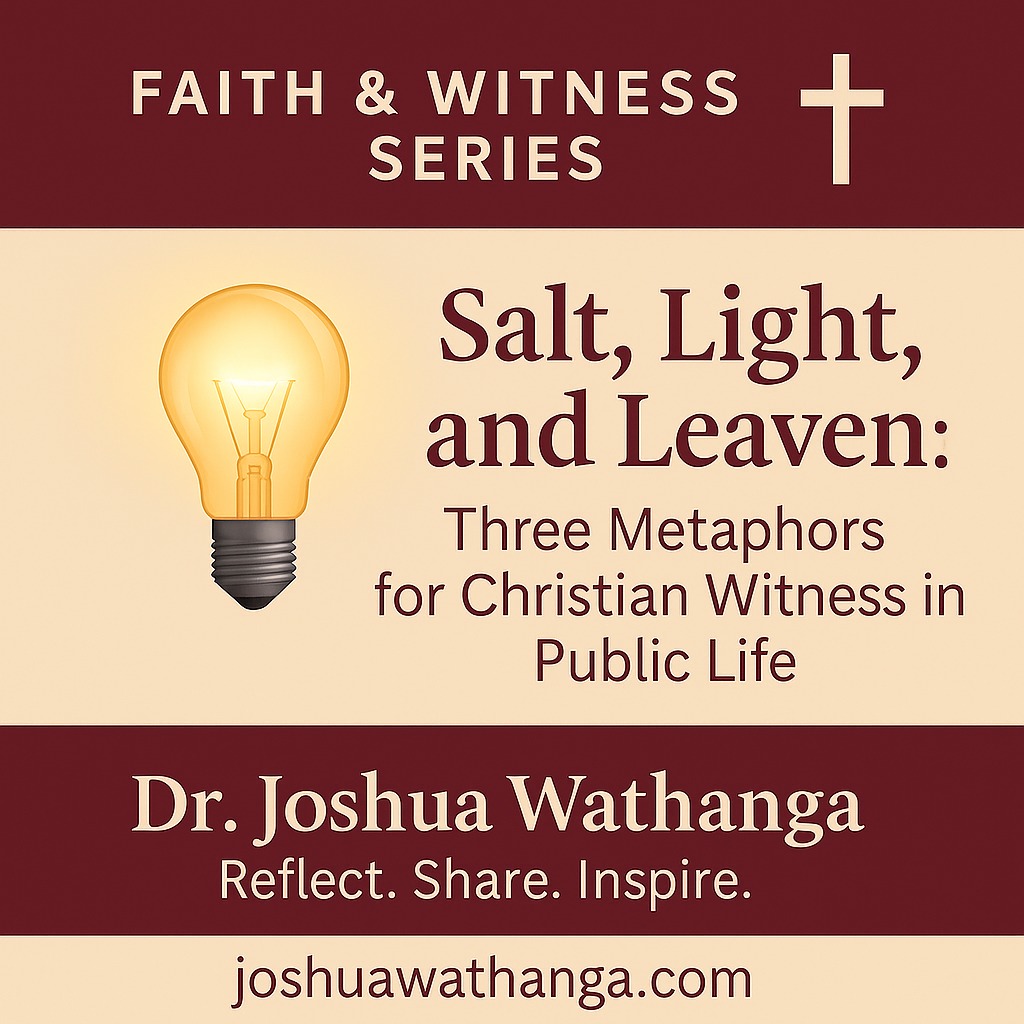John Stott once wrote:
“If the house is dark when nightfall comes, there is no sense in blaming the house; the question to ask is, ‘Where is the light?’
“If the meat goes bad, there is no sense in blaming the meat; the question to ask is, ‘Where is the salt?’ Just so, if society deteriorates and its standards decline … the question to ask is, ‘Where is the Church?’”
These words have always pierced me. They remind us that Christian witness is not about lamenting the decay of society from a distance, but about embodying God’s presence within it. Jesus gave us three metaphors that describe our role in public life: salt, light, and leaven (Matt. 5:13-16; Luke 13:20-21).
1️⃣ Salt — Preserving, Purifying, and Bringing Flavor
There is nothing strange about the decay of society; it is the default setting. The world is always in danger of decay and putrefaction. Neither socio-economic progress or democracy can stem this systemic tendency to decay. Jesus declares that we, the Christian, has what it takes to preserve society!
Salt preserves food from decay, purifies what is unclean, and adds flavor. To be the salt of the earth is to prevent moral rot, to uphold integrity, and to bring the distinct “taste” of God’s justice and compassion into public life.
In Kenya, salt has been visible at critical moments — believers mediating during post-election violence, or churches leading reconciliation efforts. But salt has also lost its savor when silence, complicity, or ethnic partisanship overshadowed truth.
At Hesabika, we often remind ourselves that if society is rotting, the question is not only “Why is the government corrupt?” but also “Where are the Christian professionals and students who are meant to be salt in the public square?” Salt does not work in the shaker — it must be rubbed into the meat. Likewise, we must enter boardrooms, classrooms, and county halls with courage and conviction.
2️⃣ Light — Revealing and Guiding in Darkness
Likewise, the world is in spiritual darkness; the whole world lies in darkness. The world may have scientific and technological expertise, but it is still in darkness.
Nothing strange here. What should surprise us is not the darkness; the surprise is that the light does not shine! Light exposes what is hidden and shows the way forward.
Jesus’ call, “You are the light of the world”, is not about seeking the spotlight but about reflecting God’s truth in dark places.
I know many Christians who, during government tendering processes, refused to pay a bribe and lost contracts. Others were not promoted even when they deserved it because they couldn’t bribe their way up. Such people have counted the cost and decided to shine a light of integrity that others could see. That kind of courage is contagious.
In 2008, after the post-election violence, I asked myself, “Where was the Church’s light?” Too often, we were dimmed by ethnic loyalties. Yet, in Rwanda, after the genocide, students at the University of Butare returned to pray and intercede. Their Vice Chancellor observed, “In this university, there are Hutus, there are Tutsis, and there are Christians.” That is what it means to be light — to shine with a different identity when the world is consumed by darkness.
3️⃣ Leaven — Small, Hidden, Transformative
Leaven (yeast) is almost invisible, yet it transforms a whole lump of dough. Jesus’ metaphor points us to the slow, hidden, patient work of influence.
I first experienced the impact of seemingly ‘insignificant’ efforts in the FOCUS Kenya Short-Term Experience in Ministry (STEM) program, which launched 33 years ago in 1992. What began as a small step of faith to disciple fresh graduates for one year of ministry, to bridge of the gap of lack of resources to employ full time staff, has since multiplied, spreading into many organizations and churches in Kenya and even influencing similar programs globally. It was on this model that the Hesabika Governance Internship Program (GIPro) was later based — a vision to disciple young professionals for public service. Today, STEM and GIPro alums are serving in all sectors of society. Like leaven, they may not be celebrated on billboards, but their faithful presence is quietly reshaping leadership and governance.
Similarly, Kenya’s vast youth bulge is either a demographic time bomb or a divine opportunity. If the Church disciples even a fraction of this generation in Christ-like leadership, the impact will be transformational, not just for congregations but for the nation as a whole.
Leaven teaches us that influence does not always roar; sometimes it rises silently, steadily, until everything is changed.
🙌 Application: Living as Salt, Light, and Leaven Today
What does this mean for us?
- Be present. Don’t withdraw. Society’s decay is not solved by retreat but by faithful engagement.
- Be consistent. Integrity in small matters builds credibility in big ones.
- Be hopeful. Darkness is real, but it is not final. Christ has overcome.
- Be patient. Transformation, like leaven, takes time. Don’t despise small beginnings.
I must confess there were times I lost my saltiness, hid my light, or grew impatient with the leaven. Those failures remind me that this is not a one-time call but a daily choice.
As Gary Haugen reminds us, the questions of injustice are not questions of God’s character but of our obedience.
Our call is not just to preach salvation but to embody reconciliation, justice, and mercy. To live as citizens of heaven in Kenya, not detached from its struggles but immersed as God’s witnesses.
✝️ A Final Word
Jesus’ metaphors are encouragement and warning in equal measure. They affirm that our small acts of faithfulness matter. But they also confront us: salt can lose its savor, light can be hidden, leaven can be resisted.
Kenya does not only need louder voices; it needs truer witnesses. May our generation take seriously the call to be salt that preserves, light that shines, and leaven that transforms.
Onwards we go.

No responses yet